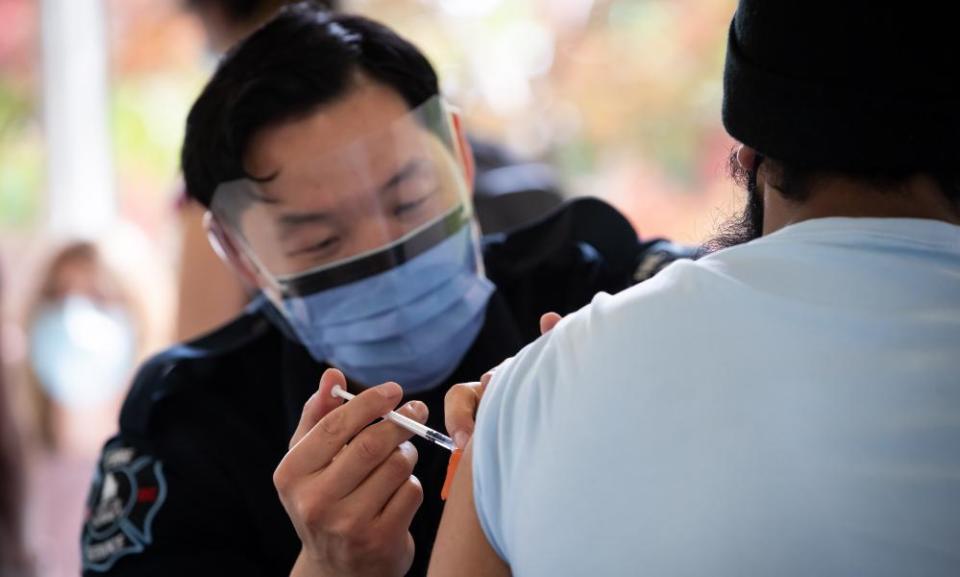Canada: vaccine rollout raises questions on what it can do for poorer nations

Canada is poised to overtake the US in the proportion of population with one dose of the coronavirus vaccine, following early delays in its rollout. But Canada’s success in quickly vaccinating residents has raised questions over what more it can be doing as the pandemic persists in poorer nations.
For months, Canada has trailed its neighbour in vaccination rates, prompting envy and frustration among residents. In March, the US was vaccinating at a rate three times that of Canada.
Canada’s initial rollout was hampered by limited supply and confusion: in December, officials in Ontario, the country’s most populous province, apologized for shutting down vaccine clinics for the holidays.
But with nearly 47% of its population covered by a single dose and new shipments arriving, the rollout has picked up speed.
“For so long, most people couldn’t get vaccinated and it felt like there was this pent-up enthusiasm from the public,” said Quynh Pham, assistant professor at the Dalla Lana School of Public Health at the University of Toronto. “The moment provincial portals opened up, it seemed people would go out and register as soon as they could.”
While there are far more Americans with two doses – 37.2% in the US compared to 3.84% in Canada – vaccine uptake in the US has plateaued. Canada’s strategy of allocating first doses to as many people as possible, while delaying second doses, should give it widespread coverage in the coming months.
Much of Canada’s recent success has come from plunging vaccine hesitancy rates.
In September, only 39% of Canadians said they would take a vaccine if it became available to them, according to recent data from the Angus Reid Institute. By mid-May, that number stood at 82%.
“I feel like people at baseline are not hesitant to get vaccinated, they just wanted more information,” said Pham.
But Canada’s success has also raised questions over vaccine hoarding among wealthy nations.
“This idea that we’re in a race to see which country vaccinates the majority of the population first is a really harmful message,” said Pham. “It takes away the spotlight from the massive disparity and inequity we’re seeing in other countries.”
In February, Canada came under fire for taking vaccines from Covax, a sharing scheme meant to help poor nations access doses.
But in April, Canada said it would ask the US for a portion of its 60m unused AstraZeneca doses, even as millions of Pfizer and Modern doses were set to arrive.
“It is not about taking vaccines from the rest of the world,” the prime minister, Justin Trudeau, said last month of the decision to request more doses. “It is a question of simply moving up timings and exchanging doses so we can get through our vaccination quicker, and all the quicker turn to supporting people around the world.”
Last week more than 600,000 doses of AstraZeneca arrived in Canada through the Covax initiative, even though provinces have paused use of the vaccine for first doses, citing supply issues and rare blood clots.
Related: Picture of two pandemics: Covid cases fall in rich west as poorer nations suffer
But with a global shortage of vaccines, Canada’s success comes at a direct cost to other nations, many of which are struggling to begin mass vaccinations of first doses.
News of production delays in India has further amplified the vaccine shortages, which experts fear will prolong the pandemic.
“Looking at the number of vaccines set to arrive, it almost feels at this point we have more than we need,” said Pham, pointing out that Canada has one of the highest vaccines-per-resident ratios after striking a number of deals with manufacturers. “If we don’t need all these doses, then we can act with the spirit of generosity. But it’s beyond just generosity – it’s the right thing to do.”

 Yahoo Finance
Yahoo Finance 